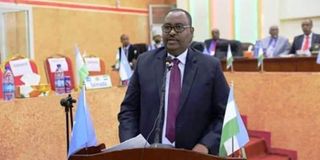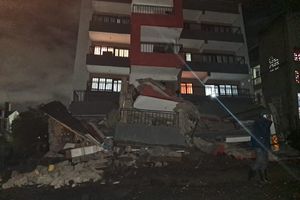Puntland leader Said Deni dangles familiar carrots for Somalia presidency

Puntland President Said Abdullahi Deni. He is promising to repair ties between Somalia and its neighbours. PHOTO | FILE | COURTESY
What you need to know:
- Deni is promising to do better than Farmaajo in saving a Somalia where terrorists, poverty and drought have combined to almost flatten the country.
- At least five million people are now displaced inside Somalia, according to the latest UN figures.
- And nearly one million are at risk of starvation. While drought and terrorism existed before Farmaajo, Deni feels bad policy has worsened the situation.
Said Abdullahi Deni, the leader of Puntland state, was not among Somalia’s presidential contenders until late last month. But he had been rumoured for months, in Somalia political circles, to be either a kingmaker or trying to become king himself in the forthcoming presidential polls, now said to take place sometime in May.
And even the initial confirmation that Deni will run for Somalia president came from his close ally, Jubbaland leader Ahmed Madobe.
“My brother Said Abdullahi Deni is going to run for the post of the federal president and needs the support of all of us,” Madobe told an audience over dinner on March 20 in Garowe, the capital of Puntland, according to a dispatch from his office then.
Both Madobe and Deni have faced familiar relationships with the federal government. They both accuse President Mohamed Farmaajo of trying to undercut their leadership in their respective federal states.
Madobe’s second term was once ‘nullified’ by President Farmaajo, but he was later admitted only as an interim leader. And although he seems headed for the full four-year term since 2019, he faces occasional opposition in some districts in Gedo.
For Deni, his federal state, one of the five in Somalia, is the oldest. Set up in 1998, it influenced the creation of others, mostly carved out of the initial 18 administrative regions in Somalia.
But Puntland’s relatively stable institutions, including a lower rate of terrorist attacks, pale in comparison with those of the federal government, whose security has mostly been beefed up with foreign support. Still, Deni accuses Farmaajo of trying to undo his successes by fuelling local feuds.
“We have been under siege by the central government as well. We have faced unprecedented efforts by the Farmaajo government to take power away from the people at the regional and local levels and to consolidate it in the hands of a few,” his office said on Monday in a statement.
“Somalia cannot afford 5 more years with a government that is at war with our country’s constitutional order. President Deni is running for president in order to correct this dangerous course we are on.”
The statement added that Deni’s presidential contest is meant to defend the rule of law, recover fragile institutions and protect Somalia’s federal system.
Deni wasn’t the only new entrant in the race. A former prime minister, Omar Sharmarke, also said he is running. And because he is also from Puntland, it could just complicate the race for everyone involved.
2016 Race
So far, two former presidents, two former prime ministers, several former ministers and new faces have announced presidential bids. The candidate pool this time could surpass that of 2016, when two dozen contenders entered the race, although several of them dropped out before polling day.
But there is something Deni brings into the game, according to Somalia political analysts. He runs a federal state that carries a significant number of representatives in the bicameral house and shares a background with the incumbent Farmaajo that he could split.
“In Deni's candidacy, Farmaajo has the most serious challenger from his own backyard. In tribal [clan] terms, between them Farmaajo and Deni share 77parliamentry votes, the biggest chunk of which Deni had a hand in picking,” Adam Aw Hirsi, a political analyst, said.
He was referring to Somalia’s indirect elections: Elected members of parliament gather to elect the president in a secret ballot. But the election of MPs is highly influenced by federal state leaders, who handpick candidates in a loose clan balancing act.
With Deni-Farmaajo clan grouping allocated 77 seats, most of which Deni had helped pick, the Puntland leader is banking on them to weaken the incumbent, Aw Hirsi argued. But there is something more: Deni’s victories have lately been in first-time contests.
“In realpolitik, Deni is a deft solicitor and a serious campaigner. In the last presidential election cycle, without any trappings and other means to speak of, and with a sitting prime minister and a former prime minister from his own clan grouping in the game, Deni garnered 18 parliamentary votes,” Aw Hirsi said of the last polls in 2016.
“In Puntland, where he is now the president, Deni won against the Goliath of the Somali Federal Government. Back then, the Villa Somalia supported a well-moneyed but unknown rookie politician.”
Deni’s networks and experience in federal politics may work for him, according to Abdimalik Abdullahi, a Somali researcher and political analyst. He was MP and minister and was involved in the 2016 campaigns.
“[He] Is believed to be financially strong,” Abdimalik added. Somalia’s past political scenes have been easier for those with money, networks among local groups and foreign entities, as well as good positioning within their clans.
Like everyone else, Deni is promising to do better than Farmaajo in saving a Somalia where terrorists, poverty and drought have combined to almost flatten the country. At least five million people are now displaced inside Somalia, according to the latest UN figures. And nearly one million are at risk of starvation. While drought and terrorism existed before Farmaajo, Deni feels bad policy has worsened the situation.
“Somalia is currently sitting at a crossroads where the progress made over the last 20+ years is in jeopardy,” he said on Monday in his presidential pitch.
“Terrorism is on the surge and atrocities are being committed against Somalis daily. The spectre of authoritarianism is hovering over the country again.”
Deni, a former minister and MP, says he will use the Puntland experience to boost security in the federal sphere. And the first step is to normalise ties with federal state leaders.
Then he spoke of running security forces better. During his administration, he argues, terror groups have reduced their strength, mostly because security forces are better equipped, and that he has improved infrastructure.
Last year, Puntland trialled universal suffrage, a first in Somalia in 50 years. Three districts elected representatives in municipal pilot polls. Western diplomats liked it. But there were hitches as some voters could not reach polling stations.
Deni thinks those were lessons to show Somalia can hold direct elections in future and wants to implement it at the federal level.
Neighbours
“President Deni stands for the presidency of Somalia, he is a leader who can save our country,” said his spokesman Jama Deparani.
“Somalia needs people to vote and peace to prevail and both are his hallmarks.”
Deni says he will repair ties with neighbours and allies so they can deal with “common threats that we face including but not limited to transnational crime and terrorism, food insecurity, and climate change”. He is rallying opposition contenders to unite under one candidate.





